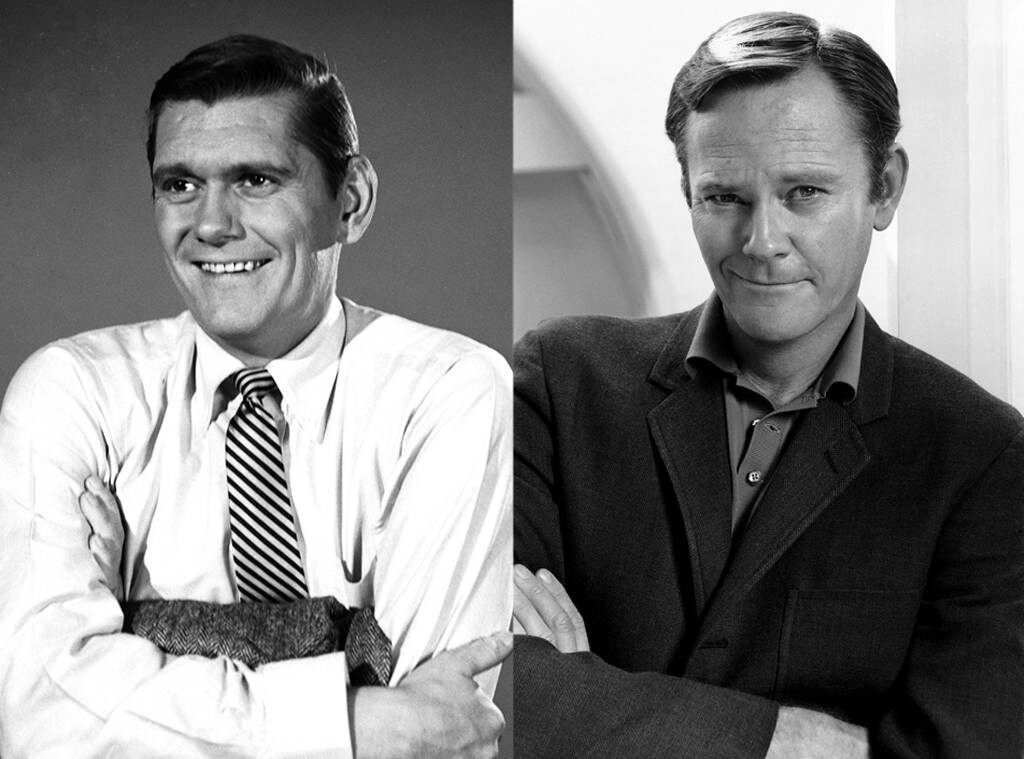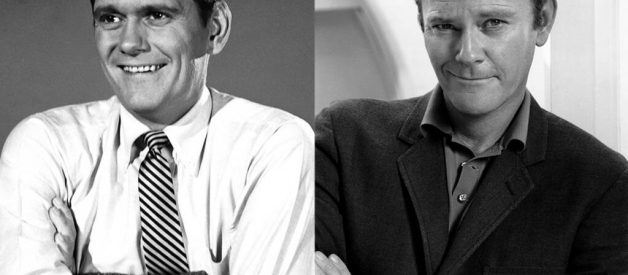The Dynamic Twin Aspects of ?Bewitched? Actors Dick York and Dick Sargent
 Dick York (left) and Dick Sargent shared the role of Darrin Stephens on ?Bewitched?
Dick York (left) and Dick Sargent shared the role of Darrin Stephens on ?Bewitched?
?I thought Dick Sargent did a marvelous job as Darrin on Bewitched.?
? Dick York
It is without a doubt the biggest double-casting controversy in the history of classic television: Dick York and Dick Sargent?s dual turn as mortal ad-man Darrin Stephens, married to Elizabeth Montgomery?s adorable witch-with-a-twitch Samantha on TV?s classic wituation comedy, Bewitched, which originally aired on ABC from 1964 to 1972.
The actors resembled one other, acted like the other, and yet were very different. Cast as Darrin before Sargent, York played the character with animated aplomb while many viewers believed that Sargent, who just so happened to be gay, portrayed a kinder-gentler Darrin. Montgomery explained it all quite diplomatically in The Bewitched Book, which was later revised as Bewitched Forever. By the time Sargent came to play Darrin, Montgomery said, the character was not as startled by Samantha?s magic (or her other-worldly characters):
?Darrin was becoming a more easygoing presence. The show?s situation almost became funnier. He would lapse into this kind of complacency and maybe into something that he just might enjoy for a minute or two. It was almost as if Darrin grew as the relationship developed. He didn?t have to be on his guard as much. So, when he was suddenly confronted by witchcraft, the newness of the marriage was gone. It wasn?t as shocking an experience ? as it [had been for York?s Darrin] was in the show?s first season.?
Double Identity
In 1989, Dick Sargent expanded on Elizabeth Montgomery?s analysis. ?To tell you the truth,? he said. ?I think there was a stronger sense of warmth between Samantha and Darrin when I did the show. Liz and I were more kissy-kissy.?
Meanwhile, Dick York always felt tagged as the neurotic, hyperactive Darrin, and wanted desperately to stop playing him as ?so damned mad at Samantha all the time.? York said. ?Why should [Darrin] come home and start raising hell every day?? As an actor, York was frequently frustrated with having to explore different ways to justify the character?s somewhat off-putting behavior. As he explained in The Bewitched Book, ?I knew when I would come home from a long day’s shooting on the show, I wouldn?t want to start ragging on my wife?So, I thought it was terribly selfish of Darrin to do the same with Samantha.?
The York Lineage
Born September 4, 1928, in Fort Wayne, Indiana, Dick York believed the seeds of his acting career were sown in his Depression-era childhood in Chicago, where he later moved with his own family, and where he began his career in radio in the late 1930s. He did several mainstream broadcast network and local television shows, such as Junior Junction, Jack Armstrong: The All American Boy, and That Brewster Boy. A student at St. Paul University, York moved to New York in 1950 and started making various remarkable TV guest appearances, including Alfred Hitchcock Presents, The Twilight Zone, and the small-screen series edition of Bing Crosby big-screen classic Going My Way (this time, starring Gene Kelly).
York began Bewitched in the fall of 1964 and left the show in the spring of 1969 due to increasing pain from an injury he endured years before on the 1959 movie set of They Came To Cordura. He retired from acting until the early 1980s, when he returned to the craft he dearly loved with guest appearances on TV-movies like High School, USA and in weekly series like Fantasy Island and Simon & Simon (the latter on which his diverse theatrical talents shined while playing a ruthless, very un-Darrin-like character).
According to his son, Chris York, the original Darrin once summarized his craft like this: ?Real things are generally too much to bear?that?s why the essence of good acting, I suppose, is just going to the point where the audience can feel it without them being embarrassed about it.?
York?s son expanded on his father?s perspective on portraying Darrin in particular:
?First and foremost because it was a love story between a man and a woman, a woman who had some extraordinary baggage number one being a meddling mother. The magic was almost secondary to the mother?s influence on their lives. He knew there was a reactionary character on the show and how he handled each situation would dictate the success or the failure of each episode. That came from his theater training knowing that you only have a limited time on stage and you better give your best performance each and every time. Darrin needed to have an understandable irritated reaction to things that happened to him but the audience had to know that no matter what predicament he was put in at the end of the day he would still be deeply in love with Samantha.?
As to his father?s take on Sargent taking over the role in the fall of 1969, Chris said:
?My dad felt that Sargent did a very fine job as Darrin on Bewitched and thought that he was unjustly criticized because not only was trying to replace a character on the television show but also replacing an actor who had his own way of interpreting the role of Samantha?s husband. It would be basically a no-win situation for almost anyone. Dick Sargent [performed] the best way he knew how with professionalism, integrity, and class.?
The Sargent Dilemma
Dick Sargent had claimed he had first won the role of Darrin before York. He was under contract with Universal to co-star in TV?s short-lived The Tammy Grimes Show. As fate would have it, Grimes? character on the show was named ?Tamantha? ? with a ?t? ? and the actress was ABC?s first choice to play Samantha on Bewitched, but she declined. (And instead took the lead in another supernatural-based production, this time on Broadway in Noel Coward?s Blythe Spirit.)
However, in 1999, Bewitched producer/director William Asher (married to Montgomery during the original run of Bewitched) said York was ?always the first choice? to play Darrin.
Born April 19th, 1930 in Carmel, California, Sargent ? like Dick York, enjoyed an extensive list of roles before and after playing Darrin. Pre-witched, he made his mark in movies like That Touch Of Mink (in with Cary Grant and Doris Day in 1962), The Ghost and Mr. Chicken (with Don Knotts in 1966), while his early TV appearances include I Dream of Jeannie (which was inspired by Bewitched?s popularity). Post-Darrin performances included TV gigs such as The Six Million Dollar Man, Here?s Lucy, and Trapper John, M.D., and feature films like Hardcore (with George C. Scott in 1976).
In Summary of Both
Dick York was married to Joan Alt from 1951 to his tragic death from emphysema on February 20, 1992. They had five children: Mandy, Christopher, Stacy, Matthew, and Kim York.
Dick Sargent was with his partner Albert Williams from 1986 to his demise on July 8, 1994, from prostate cancer (and not AIDS, as has been periodically and falsely reported).
Since 2002, Mark Simpson, a life-long Bewitched enthusiast and authority, has organized the acclaimed Bewitched Fan Fare events, which are attended by the show?s devotees from all over the world. As far as he?s concerned, both York and Sargent delivered equal top-notch performances:
?Dick York?s comic timing and chemistry with Elizabeth Montgomery and the rest of the cast is undeniable. He was brilliant, especially considering that he was in constant pain from a severe back injury throughout his entire time on the show. You would never know it from his performance, which was considerably under-rated. He was definitely not given the credit he deserved. He was Darrin Stephens. He made the role, and the feel of the show changed without him.
?Dick Sargent, who was originally considered for the part along with Richard Crenna, was chosen to replace York after he was forced to leave following Season 5. The comparison of the two actors is still talked about today, more than 46 years later. I feel that Sargent portrayed Darrin admirably. It had to have been hard for him to take over a character that someone else had played for 5 years, especially when he was expected to act like Dick York. After a while, when the producers realized that didn?t work and let him act like himself, he became more comfortable in the role and, in my opinion, made it his own. The chemistry with Liz was different. Not bad, but different, and the show even had a different feel, but he went on to do a commendable job as Darrin for the final 3 years.?
? ? ? ? ? ? ? ? ? ? ? ? ?
This article is edited material from the book, Dashing, Daring and Debonair: TV?s Top Male Icons From The ?50s,s, ?60s, and ?70s by Herbie J Pilato, host of the classic TV talk show, Then Again with Herbie J Pilato. Pilato is also the author of The Bewitched Book, Bewitched Forever, Twitch Upon a Star, The Essential Elizabeth Montgomery, and Mary: The Mary Tyler Moore Story, among other pop-culture books. For more information, visit www.HerbieJPilato.com


